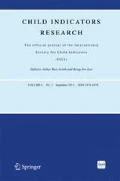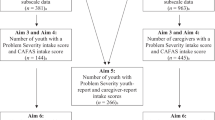Abstract
A large body of evidence suggests that the risk for adjustment difficulties in children of parents with a chronic medical condition (CMC) depend on a number of demographic, illness-related, child adaptational, and family characteristics. In particular, internalizing problems are common in children with parental CMC. This longitudinal study describes the development and psychometric properties of the Screening Instrument for Adolescents of Parents with Chronic Medical Condition (SIAPCMC), a measure intended to assess the risk for future clinical internalizing problems. Based on a meta-analysis and empirical research, risk factors for internalizing problem behavior were identified and converted into a set of key questions. Finally, questions with high predictive value for internalizing problems were selected, yielding an 8-item measure. The SIAPCMC items cover caregiving characteristics, daily hassles affecting personal life, child report of stress, active problem solving, and quality of parent attachment. From 149 adolescents (age range = 10–20 years, mean age = 15.5, number of families = 104) who participated at Time 1, 120 adolescents also completed questionnaires 1 year later (Time 2). Adolescents filled in a test battery including the SIAPCMC and the Youth Self-Report. The SIAPCMC showed excellent reliability (Cronbach’s alpha = .88–.90) and satisfactory repeated measures correlation (r = .67) over 1 year. The indices for construct and predictive validity were good. The SIAPCMC proved to be sensitive in identifying children with future internalizing problems. Our results indicate that the SIAPCMC has sound psychometric properties. The SIAPCMC should be further tested in clinical and non-clinical settings to ground its practical use for prevention of future internalizing problems.
Similar content being viewed by others
References
Achenbach, T. M. (1991). Manual for the youth self-report and 1991 profile. Burlington: University of Vermont, Department of Psychiatry.
Achenbach, T. M., & Edelbrock, C. (1995). Manual for the child behavior checklist and revised behavior profile. Burlington: University of Vermont, Department of Psychiatry.
Achenbach, T. M., & Rescorla, L. A. (2001). Manual for the ASEBA school-age forms & profiles. Burlington: University of Vermont, Research Center for Children, Youth, & Families.
Altman, D. G. (1991). Practical statistics for medical research. London: Chapman and Hall.
Armsden, G. C., & Greenberg, M. T. (1987). The inventory of parent and peer attachment: individual differences and their relationship to psychological well-being in adolescence. Journal of Youth and Adolescence, 16, 427–453.
Bach, J. F. (2008). Why is the incidence of autoimmune diseases increasing in the modern world? presented at Society for Endocrinology. Endocrine Abstracts, 13, 9.
Barkmann, C., Romer, G., Watson, M., & Schulte-Markwort, M. (2007). Parental physical illness as a risk for psychosocial maladjustment in children and adolescents: epidemiological findings from a national survey in Germany. Psychosomatics, 48, 476–481.
Carr, D., & Springer, K. W. (2010). Advances in families and health research in the 21st century. Journal of Marriage and Family, 72, 743–761.
Cohen, J. (1992). A power primer. Psychological Bulletin, 112, 155–159.
Dufour, M. J., Meijer, A. M., van de Port, I., & Visser-Meily, J. M. A. (2006). Daily hassles and stress in the lives of children with chronically ill parents. Nederlands Tijdschrift voor de Psychologie en haar Grensgebieden, 61, 51–64.
Fairweather, D., & Rose, N. R. (2004). Women and autoimmune diseases. Emerging Infectious Diseases, 10, 2005–2011.
Green, S. B., Salkind, N. J., & Akey, T. M. (2002). Using SPSS for windows: Analyzing and understanding data (2nd ed.). New Jersey: Prentice Hall.
Hartong, I., Krol, M., Maaskant, A., Plate, A., Schuszler, D., Meijer, A. M. (2003). Psst… are you asleep? study on the quality of sleep. Unpublished manuscript, University of Amsterdam.
Kim, S., & Feldt, L. S. (2008). A comparison of test for equality of two or more independent alpha coefficients. Journal of Educational Measurement, 45, 179–193.
Korneluk, Y. G., & Lee, C. M. (1998). Children’s adjustment of parental physical illness. Clinical Child and Family Psychology Review, 1, 179–193.
Kraemer, H. C. (2004). Reconsidering the odds ratio as a measure of 2 × 2 association in a population. Statistics in Medicine, 23, 257–270.
Landis, J. R., & Koch, G. G. (1977). The measurement of observer agreement for categorical data. Biometrics, 33, 159–174.
Lubkin, I. M., & Larsen, P. D. (2006). Chronic illness: Impact and interventions. London: Jones and Barlett Publishers.
Meijer, A. M., van Oostveen, S. J. E., & Stams, G. J. J. M. (2008). Caring for an ill parent: the relationship between caring, parental disease, and the child’s problem behavior. Kind en Adolescent: Tijdschrift voor Pedagogiek, Psychiatrie en Psychologie, 29, 208–220.
Pakenham, K. I., Bursnall, S., Chiu, J., Cannon, T., & Okochi, M. (2006). The psychosocial impact of caregiving on young people who have a parent with an illness or disability: comparisons between young caregivers and noncaregivers. Rehabilitation Psychology, 51, 113–126.
Reitz, E. (2004). Problem behaviour during early adolescence and child, parent, and friends effects. A longitudinal study. Unpublished doctoral dissertation, University of Amsterdam.
Rolland, J. S. (1999). Parental illness and disability: a family systems framework. Journal of Family Therapy, 21, 242–266.
Schreurs, P. J. G., van de Willige, G., Tellegen, B., & Brosschot, J. F. (1993). Utrechtse coping lijst: UCL-A Handleiding [Utrecht Coping List: UCL-A Manual]. Lisse: Swets en Zeitlinger.
Shifren, K., & Kachorek, L. V. (2003). Does early caregiving matter? The effects on young caregivers’ adult mental health. International Journal of Behavioral Development, 27, 338–346.
Sieh, D. S., Meijer, A. M., Oort, F. J., Visser-Meily, J. M. A., & van der Leij, D. A. V. (2010a). Problem behavior in children with a chronically ill parent: a meta-analysis. Clinical Child and Family Psychology Review, 13, 384–397.
Sieh, D. S., Meijer, A. M., & Visser-Meily, J. M. A. (2010b). Risk factors for stress in children after parental stroke. Rehabilitation Psychology, 55, 391–397.
Sieh, D. S., Visser-Meily, J. M. A., & Meijer, A. M. (2011). Jonge mantelzorger heeft behoefte aan aandacht [Young caregiver needs attention]. Jeugd en Co Kennis, 5, 18–26.
Sieh, D. S., Dikkers, A. L. C., Visser-Meily, J. M. A., Meijer, A. M. (2012a). Stress in adolescents with a chronically ill parent: Inspiration from Rolland’s family systems-illness model. Journal of Development and Physical Disabilities, 6, 591–606.
Sieh, D. S., Oort, F. J., Visser-Meily, J. M. A., Meijer, A. M. (2012b). Mediators for internalizing problem behavior in adolescents with a chronically ill parent: The utility of the transactional stress and coping model. Manuscript submitted for publication.
Sieh, D. S., Visser-Meily, J. M. A., & Meijer, A. M. (2012c). Differential outcomes of adolescents with chronically ill and healthy parents. Journal of Child and Family Studies. doi:10.1007/s10826-012-9570-8.
Sieh, D. S., Visser-Meily, J. M. A., Oort, F. J., & Meijer, A. M. (2012d). Risk factors for problem behavior in adolescents of parents with a chronic medical condition. European Child and Adolescent Psychiatry, 21, 459–471.
Snijders, T. A. B., & Bosker, R. J. (1999). Multilevel analysis: An introduction to basic and advanced multilevel modeling. London: Sage.
Statistics Netherlands (2009). Dutch educational level higher than EU average. Retrieved March 27, 2012, from http://www.cbs.nl/nl-NL/menu/themas/onderwijs/publicaties/artikelen/archief/2009/2009-2806-wm.htm.
Visser, A., Huizinga, G. A., Hoekstra, H. J., van der Graaf, W. T., Gazendam-Donofrio, S. M., & Hoekstra-Weebers, J. E. (2007). Emotional and behavioral problems in children of parents recently diagnosed with cancer: a longitudinal study. Acta Oncologica, 46, 67–76.
Welch, A. S., Wadsworth, M. E., & Compas, B. E. (1996). Adjustment of children and adolescents to parental cancer. Cancer, 77, 1409–1418.
Wikman, A., & Wärneryd, B. (1990). Measurement errors in survey questions: explaining response variability. Social Science & Medicine, 22, 199–212.
Author information
Authors and Affiliations
Corresponding author
Rights and permissions
About this article
Cite this article
Sieh, D.S., Oort, F.J., Visser-Meily, J.M.A. et al. Determining Risk Factors for Internalizing Problem Behavior: The Screening Instrument for Adolescents of Parents with Chronic Medical Condition. Child Ind Res 6, 345–361 (2013). https://doi.org/10.1007/s12187-012-9176-0
Accepted:
Published:
Issue Date:
DOI: https://doi.org/10.1007/s12187-012-9176-0




